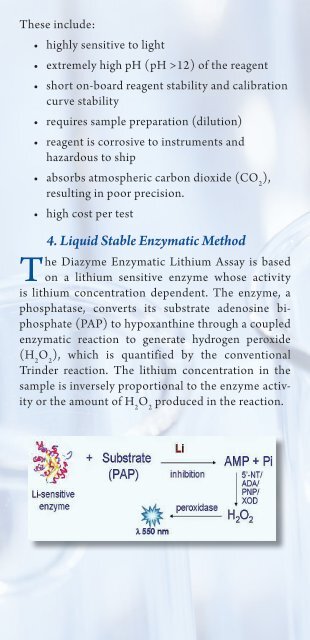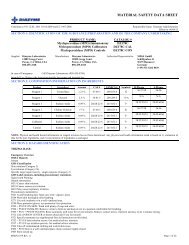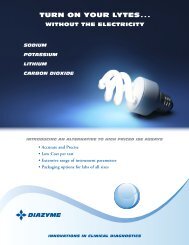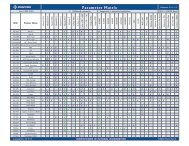Lithium test - Diazyme Laboratories
Lithium test - Diazyme Laboratories
Lithium test - Diazyme Laboratories
You also want an ePaper? Increase the reach of your titles
YUMPU automatically turns print PDFs into web optimized ePapers that Google loves.
These include:<br />
• highly sensitive to light<br />
• extremely high pH (pH >12) of the reagent<br />
• short on-board reagent stability and calibration<br />
curve stability<br />
• requires sample preparation (dilution)<br />
• reagent is corrosive to instruments and<br />
hazardous to ship<br />
• absorbs atmospheric carbon dioxide (CO 2 ),<br />
resulting in poor precision.<br />
• high cost per <strong>test</strong><br />
4. Liquid Stable Enzymatic Method<br />
T he <strong>Diazyme</strong> Enzymatic <strong>Lithium</strong> Assay is based<br />
on a lithium sensitive enzyme whose activity<br />
is lithium concentration dependent. The enzyme, a<br />
phosphatase, converts its substrate adenosine biphosphate<br />
(PAP) to hypoxanthine through a coupled<br />
enzymatic reaction to generate hydrogen peroxide<br />
(H 2 O 2 ), which is quantified by the conventional<br />
Trinder reaction. The lithium concentration in the<br />
sample is inversely proportional to the enzyme activity<br />
or the amount of H 2 O 2 produced in the reaction.<br />
4. The <strong>Diazyme</strong> Enzymatic<br />
<strong>Lithium</strong> Assay<br />
Performance Summary<br />
The <strong>Diazyme</strong> Liquid Stable Enzymatic method<br />
offers significant advantages over current existing<br />
lithium <strong>test</strong>ing methods including flame atomic<br />
emission spectrometry (FAES) method, Ion-Selective-Electrode<br />
(ISE) method and the porphyrin dye<br />
method in the following aspects:<br />
• highly lithium specific and less interference<br />
• traceable to NIST standard<br />
• on-board reagent stability ≥ 4 weeks,<br />
and calibration curve stability ≥ 2 weeks<br />
• no sample preparation (dilution) required<br />
• less sensitive to light<br />
• neutral pH, not corrosive to instruments,<br />
and not hazardous to ship<br />
• not affected by atmospheric CO 2<br />
• more cost effective<br />
• fully automated for all chemistry analyzers<br />
Product Features<br />
Compared to existing methods, the new <strong>Diazyme</strong><br />
Liquid Stable Enzymatic <strong>Lithium</strong> Assay provides<br />
improved reagent stability and a dramatically reduced<br />
cost per <strong>test</strong>. The assay features excellent accuracy and<br />
precision and offers an extended reportable range of<br />
0.19 - 3.1 mmol/L lithium, which will reduce the need<br />
for re<strong>test</strong>ing elevated patient samples. The method<br />
also demonstrates insignificant bias from endogenous<br />
ions and other interfering substances including hemoglobin,<br />
bilirubin, triglycerides and ascorbic acid. The<br />
assay can be used on most common clinical chemistry<br />
analyzers, and application parameters are available<br />
from <strong>Diazyme</strong>.








